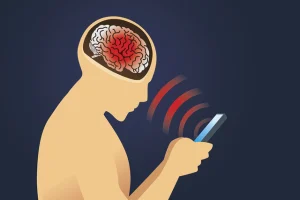Spending just a few days without your smartphone can actually change how your brain works, according to a new study published in Computers in Human Behavior. Scientists found that after only 72 hours without using a smartphone, the brain areas related to rewards and self-control started working differently. This shows that always being connected to our phones may affect our brains more than we think — especially in how we handle rewards and control our impulses.
Smartphones are now a big part of daily life. We use them for everything — from work and socializing to entertainment. For many people, phones have become more than just a tool — they’ve become a habit. Because of this, scientists are trying to better understand how constant smartphone use might affect our mental health and brain activity.

Some experts are even wondering if using phones too much is similar to addiction. While “smartphone addiction” isn’t officially agreed upon, more and more researchers believe that too much phone use can be bad for both the mind and body.
To learn more, scientists studied what happens in the brain when people stop using their phones for a while. They wanted to see if the brain reacts to phone-related cues (like notifications) in ways that are similar to cravings. They also wanted to know if these changes are like what happens with gaming or drug use.
Earlier research showed that people who use their phones a lot may have different brain patterns compared to those who use them less. This new study looked at whether these brain differences can change when someone takes a break from their phone — and it turns out, they can.
“Smartphones are a big part of our everyday lives now,” said Robert Christian Wolf, a lead researcher and deputy director at Heidelberg University Hospital. “But we’re starting to worry about how they might affect our mental health and how our brains work.”
Wolf and his team wanted to find out what happens to the brain when people stop using their smartphones for a short time. They focused on areas of the brain linked to rewards and attention. Since more people are talking about the effects of phone use on well-being, the team wondered if taking a break would make a real difference in brain activity.

To test this, they picked 25 young adults between 18 and 30 years old who use their phones often. None of them had serious mental health issues or internet gaming problems. Each person had two brain scans — one before the break and one after. These scans used a method called fMRI, which shows changes in brain activity.
Before the first scan, everyone answered questions about their phone habits, mood, and how much they were craving phone use. After the scan, they were told to use their phones as little as possible for the next 72 hours. They could still use them for essential things like work, daily tasks, or quick chats with close people — but no scrolling, social media, or games.
During the break, they weren’t closely watched, but they did answer short surveys each day about their mood, cravings, and phone use. These daily answers are being studied in another part of the research and were not the focus of this study.
After three days, they came back for the second scan. They also repeated the mood and craving questions. During both brain scans, the participants were shown different pictures while in the scanner: regular objects, phones that were turned off, and phones that were on and being used.
By comparing how the brain reacted to each type of image before and after the phone break, the researchers were able to see if less phone use made a real change in how the brain responds to phone-related things.

The researchers looked at the brain scans (fMRI results) to see how brain activity changed between the first and second sessions. They focused on areas of the brain that help process rewards and control attention. They compared how the brain reacted to pictures of smartphones versus neutral pictures (like normal objects), and also compared phones that were turned on vs. turned off.
They also checked if the brain changes were linked to each person’s phone habits, how much they craved phone use, or how they were feeling emotionally. Then, they went a step further — using brain maps to see if these brain changes were connected to certain brain chemicals like dopamine and serotonin, which play a role in reward and mood.
Surprisingly, the surveys didn’t show any big changes in how the participants felt or how much they craved their phones after the 72-hour break. But the brain scans told a different story.
When participants saw phone-related images (whether the phones were on or off), their brains showed more activity in two areas: the anterior cingulate cortex and the nucleus accumbens. These areas are known to be involved in craving and reward — they’re the same parts of the brain that “light up” when people crave things like sugar or even drugs. So even though the participants didn’t feel more craving, their brains reacted more strongly to phones after not using them for three days.

“We found something really interesting,” said Wolf in an interview with PsyPost. “After 72 hours without a phone, participants’ brains responded more to smartphone cues. This is similar to how the brain reacts in addiction studies. But we didn’t see those changes in their mood or cravings based on the questionnaires — which was unexpected.”
There was another twist. When the researchers focused only on images of turned-on phones (compared to turned-off ones), they found less activity in certain brain areas after the break — including the middle frontal gyrus and superior parietal lobule. These parts help with attention, seeing, and movement. The drop in activity suggests that after taking a break, turned-on phones became less exciting or attention-grabbing to the brain.
What Else Did the Study Find About the Brain and Smartphones?
The researchers also found that a part of the brain called the parietal cortex was linked to cravings for smartphone use. This means that this area might be involved in how we feel the need to check our phones. They also saw that the changes in brain activity were connected to systems that use dopamine and serotonin — chemicals in the brain that play a big role in reward and addiction.
“Our study shows that even a short phone break can lead to changes in the brain,” explained Robert Wolf, one of the study authors. “These changes happened in areas related to rewards and self-control. This suggests that using smartphones a lot could affect the brain in a way that’s similar to other habits that feel rewarding.”
However, he added that the changes were only seen in the brain scans — not in people’s behavior or emotions. So longer breaks from smartphones might be needed to see bigger changes in how people feel or act.
What the Study Didn’t Cover
Wolf also pointed out some limits to the study.
-
It only looked at short-term effects — we don’t know how long these brain changes last.
-
The study didn’t track real-life behavior, like whether people felt more focused or less distracted.
-
And it’s still unclear whether the brain changes caused phone use, or if phone use caused the changes.
More research is needed to better understand the long-term effects of smartphone use, and whether cutting back over time could lead to real, positive changes in behavior and mental health.
What’s Next?
Looking ahead, the researchers want to study the effects of smartphone use over longer periods. They’re especially interested in how it affects attention, mood, and how people control their thoughts and actions. They also want to explore why some people get more hooked on their phones than others.
Final Thoughts
The researchers made it clear that this study isn’t trying to make smartphones look bad.
“We’re not saying smartphones are evil,” Wolf said in an interview. “Technology has a lot of benefits. But it’s also important to understand how our habits affect our brains and well-being. If we can use our phones more mindfully, we might be able to create a healthier relationship with them.”



